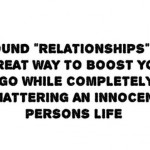‘But you just broke up!’ Ever heard that one?
Yep, that one rings as soon as you confide in someone about the details of finding solace in the company of another even before your lingering emotions/residual feelings for your ex have evaporated! But I have often wondered why token refrains picked from movies are thrown right in the face of someone in a rebound relationship. Now don’t get me wrong – all rebound relationships tread on precarious ground and start out as a relationship in which you find comfort in the safety that another human provides in lieu of the one that you most recently lost. As such, it is likely that the bond fizzles out as soon as you are stable enough to let some reason kick in or even that it escalates into a long term, stable, and happy partnership.
Image source: Pixabay, under Creative Commons License
Suggested read: 7 reasons why rebound relationships are a BAD idea
Either way, I am wary of the ‘rebound relationships are doomed’ syndrome that has claimed millions. Of course, breakups are heart wrenching experiences marked by distress, unbearable pain, and even a loss of sense of self. But is finding a safe haven in the arms of another an unhealthy coping strategy? Is finding comfort in the consolation that a rebound partner offers simply an indulgent distraction? Is one’s naked vulnerability in the face of a breakup the only reason one can forge an intimate connection with another soul? Are rebound relationships doomed to fail? Are rebound relationships all bad – whether or not they turn into something substantial?
Science answers all those questions with a big, resounding NO!
Image source: Pixabay, under Creative Commons License
Studies prove that the hint of a smile brought about by someone who hands out tissues while you cry and mumble incoherent babble about your ex CAN mean something more than a flimsy boost to one’s ego, self-esteem, and maybe even a latent, subconscious desire to get back at an ex.
How? Let’s take a look.
Brumbaugh and Fraley define rebound relationships as “romantic relationships that begin shortly after a previous relationship has ended but before the emotions tied to that previous relationship have been resolved.” In short, any relationship that cuts short a person’s single time between relationships/attachment, sometimes eliminating it altogether.
Image source: Pixabay, under Creative Commons License
While common dating wisdom advises against any relationship begun ‘too soon’ after a previous one has ended, for it eliminates the possibility of dealing with grief, its acceptance, and any likelihood of an assessment of the previous relationship, the things that went wrong, an ownership of one’s half in the fallout, and a solid awareness about what one really needs, Science has confirmed that these concerns, while stemming from good intent, are unwarranted.
Rebound relationships can actually be good for one’s emotional and mental health. Recent evidence suggests that people who dive into rebound relationships get over their ex-partner more quickly and feel more confident in their date-ability (Brumbaugh & Fraley, 2014). Brumbaugh and Fraley also foreground a correlation between the time gap between a breakup and a rebound and its consequent effect on one’s mental and emotional states. The lesser the time between a breakup and a new relationship, greater the levels of well-being, overall self-esteem, and respect for a new partner.
Image source: Pixabay, under Creative Commons License
Furthermore, contrary to popular belief, having less time between a breakup and a new relationship is linked to attachment security—which refers to habits of trusting, comfort with intimacy, and feelings of safety in relationships. In other words, individuals who were emotionally stable were found to need lesser time between a relationship’s end and a new one’s beginning. There, however, remains a gap in research about people whose cognitive coping strategies might be distorted by unhealthy patterns of addiction, co-dependence or even emotional instability.
Most people in the opposite faction build their case against rebound relationships – foregrounding the negation of the healing process in face of incomplete closure, partial confrontation with unresolved emotions, and residual feelings, an unfinished assessment of the toxic patterns in the previous relationship and an overshadowing of the self-actualization process by the ego-bolstering potential of a new, comfortable substitute for the ex. However, science avers that in making such a case, these anti-rebound lawyers completely overlook the potential for healing as well as learning that occurs within the contrast of a new relationship. Focusing on someone new, according to the research on the subject of rebound relationships, can help a person recover from a breakup (Spielmann, S., Macdonald, G., & Wilson, A., 2009).
Suggested read: 20 simple steps to get your groove back after a breakup
Of course, researchers do not rule out the possibility of a misguided attempt at rebound relationships in order to find an outlet for anger toward an ex-partner or make them jealous, or worse, expose emotions that haven’t quite reached dissolution in an attempt to get them back. But in all such cases where the rebound is bound to end sooner or later as well as the genuine attempts to ‘move on’ with the help of a rebound partner, studies evince that rebound relationships can play a pivotal role in allowing individuals to recover from their anger, feelings of loss, and even pain and distress!
Image source: Pixabay, under Creative Commons License
It is equally true that the sooner the partners are on the rebound, the quicker they are to compare the rebound partners with their ex. But this too, according to science, isn’t necessarily a bad thing. In most cases, this comparison helps the recently broken-up partner to gauge satisfaction levels on parameters that had been poor faring ones in the previous relationship and end up valuing the rebound much more for the fulfillment it provides. In case the rebound fails to score well too, the partners achieve clarity on what they require from relationships. Either way, the NEW connection helps them move on!
Which is why we, at NLT, are replacing the overused and wrongly-used ‘but you just broke up’ remark with ‘get back out there!’ Science has given us the nod!
Feature image source: Google, copyright-free image under Creative Commons License

















